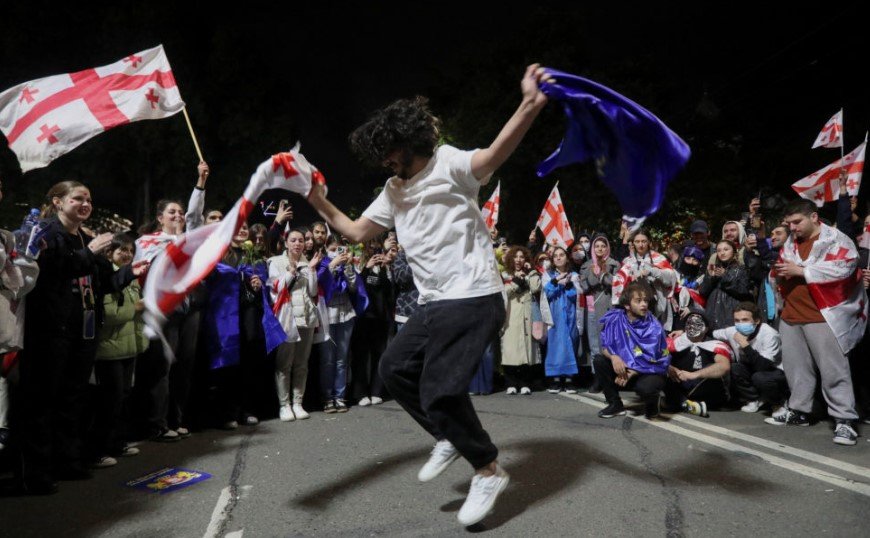Georgian Prime Minister Irakli Kobakhidze accused protesters of plotting to overthrow the government during a tense standoff at the presidential palace in Tbilisi on October 5, 2025. He pointed fingers at the European Union for meddling in the country’s affairs, sparking fresh diplomatic tensions amid ongoing local elections and widespread demonstrations.
Protests Erupt Amid Local Elections
Thousands of demonstrators gathered in Tbilisi on Saturday, clashing with riot police outside the presidential palace. Authorities used water cannons and pepper spray to push back the crowd, leading to several arrests.
The unrest came on the same day as municipal elections, where the ruling Georgian Dream party claimed a sweeping victory. Opposition groups boycotted the vote, calling it unfair and rigged.
Protesters demanded fair elections and closer ties with Europe. Many waved EU flags and chanted against the government, reflecting deep frustrations over Georgia’s political direction.
Security forces reported finding a large cache of weapons, including explosives and ammunition, hidden in a forest near the capital. Officials linked these items to plans for disruptive acts during the protests.

Kobakhidze’s Strong Accusations Against EU
Prime Minister Kobakhidze described the protests as a failed coup attempt backed by foreign influences. He estimated up to 7,000 people joined the rally but said their efforts to breach the palace aimed at toppling the constitutional order.
He directly blamed the EU ambassador to Georgia, Pawel Herczynski, for supporting the unrest. Kobakhidze urged the ambassador to condemn the actions and stay out of internal matters.
In response, EU officials rejected the claims as disinformation. They condemned personal attacks on the ambassador and called for calm from all sides.
This incident adds to strained relations between Georgia and the West. Once seen as a pro-European standout in the region, Georgia has faced criticism since Russia’s 2022 invasion of Ukraine for shifting toward closer ties with Moscow.
Background of Georgia’s Political Turmoil
Georgia’s opposition has protested since last year’s parliamentary elections, which they say were fraudulent. The Georgian Dream party, in power since 2012, denies these allegations and points to economic growth as proof of its success.
Recent events have heightened concerns about democratic backsliding. Laws restricting foreign-funded NGOs and media have drawn parallels to Russian-style controls, alarming Western allies.
The country of 3.7 million people sits at a crossroads between Europe and Asia. Its bid for EU membership, granted candidate status in 2023, now hangs in balance amid these conflicts.
Public opinion remains divided. Polls show strong support for EU integration among urban voters, while rural areas back the government’s cautious approach.
Here is a quick look at key political figures involved:
- Irakli Kobakhidze: Prime Minister, leader of Georgian Dream, vocal critic of Western interference.
- Salome Zourabichvili: President, often aligns with pro-Western views, has supported protesters in the past.
- Bidzina Ivanishvili: Billionaire founder of Georgian Dream, seen as the party’s influential figure behind the scenes.
Impact on EU-Georgia Relations
The accusations have rippled through international circles. EU leaders expressed concern over the crackdown on dissent and urged dialogue to resolve the crisis.
Georgia’s government vowed a further crackdown on what it calls foreign agents. Kobakhidze promised to neutralize threats to stability, raising fears of more arrests.
Analysts worry this could delay Georgia’s EU aspirations. The bloc has already paused some funding and called for reforms to ensure free elections.
In a broader context, similar tensions have played out in neighboring countries like Ukraine and Moldova, where pro-European movements clash with pro-Russian elements.
| Key Events in Georgia’s Recent Protests | Date | Description |
|---|---|---|
| Parliamentary Election Dispute | October 2024 | Opposition claims fraud, sparking initial protests. |
| EU Membership Bid Halt Threat | November 2024 | Government signals pause on integration talks until 2028. |
| Municipal Elections Clash | October 5, 2025 | Protesters storm palace; police respond with force. |
| Weapons Cache Discovery | October 6, 2025 | Security forces uncover arms linked to subversion. |
Global Reactions and What Comes Next
World leaders watched closely as the events unfolded. The United States echoed EU calls for restraint, while Russia praised Georgia’s handling of what it termed external meddling.
Social media buzzed with videos of the clashes, amplifying global awareness. Hashtags like #StandWithGeorgia trended, drawing support from activists worldwide.
Experts predict more unrest if election results stand without investigation. The opposition plans legal challenges and further rallies in coming days.
For now, Tbilisi remains tense, with police on high alert. The government insists it acts to protect national sovereignty, but critics see it as a power grab.
What do you think about these developments in Georgia? Share your thoughts in the comments below and spread the word by sharing this article with others interested in global politics.
